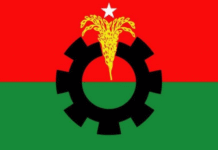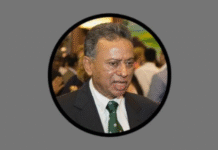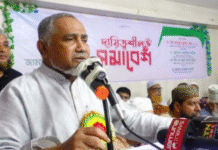During the 1996-2001 term of the Awami League, there was a Deputy High Commissioner (DHC) of Bangladesh in Calcutta who felt that West Bengal and opinion generated in media there should have a significant input in determining Bangladesh’s relations with India. One reason for the DHC’s confidence in West Bengal was the very important role that the state and its Chief Minister had played in the Ganges Water Sharing Treaty in 1996. It was also the time when regional parties had a major role in shaping and keeping coalitions in New Delhi in power in which the West Bengal’s Chief Minister Jyoti Basu had a great influence. In fact he was considered as a possible Prime Minister of India.
The above notwithstanding, the unwritten rule those days in the Bangladesh Foreign Ministry was to trash reports in West Bengal’s media on Bangladesh. The reasons for such an unwritten rule were many. First, New Delhi never bothered about West Bengal’s views on Bangladesh and spared no time to what appeared in West Bengal media about Bangladesh. Second, West Bengal media sensationalized, exaggerated and dramatized reports about Bangladesh that the Ministry officials knew were untrue and thus garbaged them sometimes without even reading. Finally, the West Bengal media suffered from the hangover they inherited from their pre-1947 days when elites in West Bengal obnoxiously and arrogantly viewed Bangladeshis as “Bangals” (uncivilized) who did not know what was good for them.
Ghoshe’s planted story
Manosh Ghosh pretended to know about one part of the visit in which everybody was interested, namely what transpired in the 15 minutes of Narendra Modi’s exclusive meeting with Khaleda Zia although neither the Indian Prime Minister’s office nor the BNP mentioned anything substantive in the media on it. He stated that the meeting was a humiliation for the BNP and its leader because of Khaleda Zia failed to answer three questions she was asked by Narendra Modi. One around which he built the article to humiliate the BNP and Khaleda Zia was about her scuttled meeting with Pranab Mukherjee when the Indian President had visited Bangladesh in March 2013. Another to underline the BNP as untrustworthy was on the 10 trucks of arms that were intercepted in Bangladesh on way to Indian secessionists in Assam during BNP’s 2001-2006 term. The writer stated that Narendra Modi had conveyed to Khaleda Zia that the postponement of her meeting with the Indian President was an insult to India.
Manosh Ghosh’s story was the ammunition that the ruling party wanted. In fact, it became a the major weapon for the pro-AL media that carried and interpreted the story like it came out of Indian Prime Minister’s office. Awami League leaders and the pro-AL media used the story to give the impression that Narendra Modi viewed the BNP like the Congress and had decided to put all of New Delhi’s eggs vis-à-vis Bangladesh in the Awami League basket. Manosh Ghosh’s story did not have the desired affect outside the AL circles for a number of reasons where it was felt that it was written to please the AL, perhaps inspired by it. First, he did not quote sources for such a dramatic article. Second, if the objective of the meeting was to humiliate the BNP and Khaleda Zia, that could have been easily achieved if Narendra Modi had denied her the meeting, which would have made his hosts very happy. Third, Narendra Modi came to Dhaka to highlight his government’s commitment for democracy and the SAARC spirit. Fourth, he was therefore as interested in meeting Khaleda Zia, as the latter was to meet him. Finally, the Prime Minister was also interested to know first hand the political situation in Bangladesh and therefore met Khaleda with that intention in mind. Manosh Ghosh perhaps had little confidence in the Indian Prime Minister and his intelligence.
Nayar critical of Modi
Manosh Ghosh’s story did not have the desired affect outside the AL circles for a number of reasons where it was felt that it was written to please the AL, perhaps inspired by it. First, he did not quote sources for such a dramatic article. Second, if the objective of the meeting was to humiliate the BNP and Khaleda Zia, that could have been easily achieved if Narendra Modi had denied her the meeting, which would have made his hosts very happy. Third, Narendra Modi came to Dhaka to highlight his government’s commitment for democracy and the SAARC spirit. Fourth, he was therefore as interested in meeting Khaleda Zia, as the latter was to meet him. Finally, the Prime Minister was also interested to know first hand the political situation in Bangladesh and therefore met Khaleda with that intention in mind. Manosh Ghosh perhaps had little confidence in the Indian Prime Minister and his intelligence.
Renowned Indian journalist and former Indian High Commissioner to Great Britain Kuldip Nayyar underlined the lack of credibility in Manosh Ghosh’s article in his own article on the visit published after that of the West Bengal journalist although he did not make any reference to Manosh Ghosh’s article. The article “A shot in the arm for Hasina” was generally ignored in the Bangladesh media for obvious reasons. But for those who read that article, they would know why the kite flown by Manosh Ghosh failed to fly so far as the people of Bangladesh were concerned. Kuldip Nayyar laid bare the current realities in Bangladesh’s politics. He expressed deep disappointment with Narendra Modi for failing to deal with Bangladesh in the context of these realities that Manosh Ghosh in his article totally ignored in his eagerness to paint the BNP as the villain. Nevertheless, Manosh Ghosh’s article explained why New Delhi under the Congress Government had reservations about the BNP and Khaleda Zia, some of which still lingers that has now forced the BNP to explain two years belated on one issue that keeps coming while explaining why New Delhi is unwilling to deal with the BNP, the issue of the scuttled President-KZ meeting in March 2013.
Zia two years too late
Khaleda Zia gave that belated explanation in an interview to an Indian journalist who had visited Dhaka with Narendra Modi. She said she had postponed the meeting on advice of her security officials who had warned her that she would be assassinated on her way to the meeting or back and that the Jamat would be blamed for it. The explanation raised a lot of eyebrows. Nevertheless, the political situation in Dhaka was extremely volatile during the Indian President’s visit and made worse by the youth uprising at Shahabag and there were genuine concerns within the BNP about their leader’s life. However, the explanation has come too late for the satisfaction of many, including those who hold neutral views on issues in the country’s highly partisan politics. At the time of the postponement, BNP had had pointed at the hartal called by Jamat for it, an explanation that was also not taken seriously because ironically for VIP events, hartal is an advantage as it makes movement in Dhaka’s otherwise unbelievably congested traffic easy and neither difficult nor risky with help from the law enforcing agencies.
Therefore, the Indian Government had a right to feel slighted and indeed they were. The BNP’s diplomatic blunder was to put forward a lame excuse of hartal to explain the postponement that it has now compounded that with a new explanation of the plot to kill Khaleda Zia that is questionable primarily because it has come 2 years too late. The BNP then and now has failed to come forward with an explanation that would have made sense, that when Pranab Mukherjee had come to Dhaka, the Congress Government was openly playing a role in Bangladesh’s internal politics in favour of the Awami League and against the BNP thus reneging on the promise that Congress leaders including Pranab Mukherjee had made to Khaleda Zia during her visit to New Delhi in November, 2012. That promise was that New Delhi would not conduct its relations with Bangladesh to uphold the interests of any political party.
Indian president’s partisan role
In fact, clear signs that the Congress Government had veered from that promise was evident when the Indian Foreign Minister visited Dhaka in the second week of February 2013, two weeks before the Indian President came to Dhaka. He took the very unusual step to visit the Shahabag Gonojagoron Mancha and gave it New Delhi’s blessings. The Mancha was by that time a movement under the control of the AL and openly doing its biddings in national politics against the BNP/Jamat and their movement to force the AL to hold elections under the caretaker government. On his arrival in Dhaka with the Shahabag Mancha’s role more pronounced towards the Awami League and against the BNP, the Indian President had said that he was sad he was unable to visit the Mancha personally because of security reasons but that his heart was with the youth and the movement they were leading. When Khaleda Zia was scheduled to meet the Indian President, New Delhi thus had already hedged its bets on the Awami League.
Thus the BNP had two options when the meeting was scheduled to take place. First, Khaleda Zia could have met Pranab Mukherjee and conveyed her misgivings in New Delhi’s partisan interference in Bangladesh’s politics. Second, she could postpone the meeting and convey the same message. The BNP apparently went for the second option because it fitted with its “India card” strategy. It must have concluded there was little political advantage in meeting the Indian President and more in postponing it. The BNP gambled and lost because it did not know the extreme extents to which India would interfere in Bangladesh’s politics to bring the AL back to power. It found that out through the unbelievable activities of the Indian Foreign Secretary when she visited Dhaka in December 2013 shortly before the crucial January 5 2014 elections. On that visit, she met HM Ershad and pressed him so that his party would participate in those elections so that the BNP/Jamat would not be able to come to power! The Congress had always favoured the AL in Bangladesh’s politics. That notwithstanding, the BNP could not be faulted for failing to predict the extent New Delhi would interfere in favour of the AL because what the Indian Foreign Secretary had revealed in her meeting with HM Ershad was simply put, unbelievable.
Reasons for Modi’s visit
The BNP’s blunder in handling the postponement thus was its failure to put the blame on New Delhi for its extremely partisan role in Bangladesh’s politics that would have been politically advantageous for it instead of the one it gave at first and has now followed up with an equally questionable one. But there is a new government in New Delhi now, one that is willing to be different from the Congress. Narendra Modi is a believer in democracy that has brought him from being a state leader to become the Indian Prime Minister. His government is also committed to reviving the SAARC spirit. He came to Dhaka with both priorities in mind and in that spirit he had met the Bangladesh Prime Minister as well as Khaleda Zia, the latter in recognition of the fact that she was in New Delhi’s perception the “shadow opposition”, notwithstanding the fact that she is not the official Leader of the Opposition.
Therefore there was no reason for the Indian Prime Minister to humiliate Khaleda Zia on account of the Indian President. As for BNP’s past anti-India role, the Indian Prime Minister was aware that the party had changed and willing to deal with New Delhi on the basis on mutual reciprocity and if returned to power, would not allow Bangladesh soil to be used for terrorist activities against India. Narendra Modi was also aware before arriving in Dhaka about the political situation in Bangladesh and that the people in the country had moved further from India than they were during Pranab’s visit, a view that was strengthened by the visit that convinced him that for India’s remaining interest in the country, namely the crucial land transit, New Delhi would need the support of the people of Bangladesh in which BNP had a major role to play.
Tale of two stories
The Indian Prime Minister’s meeting with Khaleda Zia was thus a strategic one to underline New Delhi’s to deal with a democratic Bangladesh. That message was however too indirect for Kuldip Nayyar who wanted New Delhi to support return of democracy in Bangladesh without delay. Nevertheless, he has credibility in New Delhi that extends on both sides of the political divide. And he also represents the civil society. Therefore his views would undoubtedly resonate in the corridors of power in New Delhi to determine the course in Bangladesh-India relations the way he wanted letting democracy lead the way. Manosh Ghosh’s article was written to derail the return of democracy in Bangladesh and written with ill intent. Therefore it would be in Bangladesh’s interest for the Foreign Ministry to resurrect its unwritten rule on reports in West Bengal media.
The writer is a former Ambassador. His email id is ambserajulislam@gmail.com
Source: Weekly Holiday









